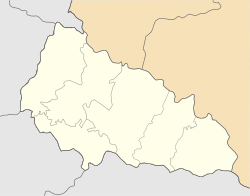Velykyi Bychkiv
Velykyi Bychkiv Великий Бичків Великый Бичкôв (in Rusyn) Nagybocskó (in Hungarian) Bocicoiu Mare (in Romanian) Velký Bočkov (in Czech) Veľký Bočkov (in Slovak) | |
|---|---|
 Greek Catholic Church of the Assumption of the Blessed Virgin | |
| Coordinates: 47°58′00″N 24°00′54″E / 47.9667°N 24.015°E | |
| Country | |
| Oblast | |
| Raion | Rakhiv Raion |
| Hromada | Velykyi Bychkiv settlement hromada |
| First mentioned | 1358 |
| Urban-type settlement status | 1947 |
| Government | |
| • Mayor | Iosif Bozhuk |
| Area | |
| • Total | 5.235 km2 (2.021 sq mi) |
| Elevation | 307 m (1,007 ft) |
| Population (2022) | |
| • Total | 9,114 |
| • Density | 1,700/km2 (4,500/sq mi) |
| Time zone | UTC+2 (EET) |
| • Summer (DST) | UTC+3 (EEST) |
| Post code | 90615 |
| Area code | +380 3132 |
| Website | http://www.bychkiv.com.ua/index.php |
Velykyi Bychkiv (Ukrainian: Вели́кий Бичкі́в; Rusyn: Великый Бичкôв; Hungarian: Nagybocskó, Nagybocska; Romanian: Bocicoiu Mare; Czech: Velký Bočkov; Slovak: Veľký Bočkov, Bočková) is a rural settlement in Rakhiv Raion (district) of Zakarpattia Oblast (province) in western Ukraine. It belongs to Velykyi Bychkiv settlement hromada, one of the hromadas of Ukraine.[1] It lies 36 kilometres (22 miles) east of Tiachiv, where the Sopurka River meets the Tisza River. Population: 9,114 (2022 estimate).[2]
History
[edit]The village was first mentioned in 1358, by the name Buchku. Its name is derived from a Slavic word meaning "bull". Before 1556 Bosckai family owned the village. From 1556 it belonged to the Báthory family. By 1711 a mansion already stood here. After the failed revolution led by Francis II Rákóczi, Germans settled in the area. The village had three parts: Nagybocskó and Kisbocskó ("Greater" and "Smaller" Bocskó), which form today's Velykyy Bychkiv, and Németbocskó ("German Bocskó") across the river (this forms today's Bocicoiu Mare in Romania).
In 1910 the village had 5955 inhabitants: 3078 Ruthenians, 1646 Hungarians and 1177 Germans by the primary language, or 3374 Greek Catholic, 1266 Roman Catholic and 1163 Jewish people by religion. It belonged to the Hungarian county of Máramaros. After World War I it belonged to Czechoslovakia, then since 1939 again became part of Hungary, before being ceded to the Ukrainian SSR in 1945.
Until 26 January 2024, Velykyi Bychki was designated urban-type settlement. On this day, a new law entered into force which abolished this status, and Velykyi Bychki became a rural settlement.[3]
Velykyi Bychkiv has a chemical, sulfuric acid and table salt factory, as well as a sawmill. In 1930 a forest railway line was built.
People from Velykyi Bychkiv
[edit]- János Balogh, biologist, member of the Hungarian Academy of Sciences, was born here on February 19, 1903
- Ottó Korvin, politician, a founder of the Communist Workers' Party, was born here on March 24, 1894
- Theodore Romzha, Greek Catholic bishop of Mukačevo, was born here on April 14, 1911
- Ivan Yaremchuk, soviet football player, was born here on September 13, 1962
- Rose Weingarten, Holocaust survivor, was born here on September 27, 1918, while it was still part of Czechoslovakia[4]
References
[edit]- ^ "Великобичківська громада" (in Ukrainian). Портал об'єднаних громад України.
- ^ Чисельність наявного населення України на 1 січня 2022 [Number of Present Population of Ukraine, as of January 1, 2022] (PDF) (in Ukrainian and English). Kyiv: State Statistics Service of Ukraine. Archived (PDF) from the original on 4 July 2022.
- ^ "Что изменится в Украине с 1 января". glavnoe.in.ua (in Russian). 1 January 2024.
- ^ "Collections Search - United States Holocaust Memorial Museum". collections.ushmm.org. Retrieved 2024-03-29.
External links
[edit]- History of Velykyi Bychkiv from Velykyi Bychkiv official website (in Ukrainian)
- Velykyi Bychkiv, at Ukrainian Verkhovna Rada portal (in Ukrainian)


 French
French Deutsch
Deutsch


